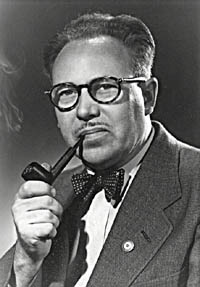
Year Born: 1897
Year Died: 1971
When Jack Radford was ten years old he left Cambridge in England for Toronto and was educated in the Public School system. His business career began in sales and promotion with a paint company and he was given a territory that took him as far east as Newfoundland and as far west as New Zealand. When the depression of the 30s ended that job, Jack turned to radio with which he had become fascinated. There were then three radio stations in Toronto and Jack “haunted’ them to learn the trade, and (now with a wife and two children) eventually managed to latch onto producing 3 programs and writing a script for another that brought in $17.50 a week.
Jack’s first big break arrived when he became host of Harry Horne’s Breakfast Club five days a week. This led to an offer of an announcing job at CFRB, but he took a better offer from Ernie Bushnell at CKNC whose studios on Davenport Road became the Toronto production centre for the CRBC and the CBC. Seven days a week he announced, wrote, generated sound effects, produced programs and acted in plays – no fees – no overtime. His salary was not generous.
Jack’s wife, Ethel, recalled the enthusiasm of a cluster of young people who were involved at the time. Percy Faith’s little group of musicians would practice in the Radfords’ living room. Many rehearsals were performed and plans were made there and around the dining-room table.
The Canadian Radio Broadcasting Commission was formed in 1933 and Jack became part of it. He was sent to Windsor to build CRCW. In the summer of 1935, he carved two notches in history with one of the first remote-control broadcasts from a private home – and the first interview with the internationally-known conservationist, Jack Miner in Kingsville, the nearby site of his bird sanctuary.
In the fall of ’35, CRBC posted Jack to Vancouver to manage CRCV which had been bought from the CNR, and to oversee the building of modern air-conditioned studios in the unfinished and unoccupied new Hotel Vancouver. By the time the studios were completed in 1936, the CBG had succeeded the CRBC and CRGV was dubbed “CBR” (later CBU). Vancouver was gifted with talent and many first-class radio programs were fed across Canada. Staff announcers at the time included Dick Claringbull, Don Wilson, Bill Herbert and (late in ’37) Hugh Bartlett who had come over from CJOR. Budding stars were John Drainie, Fletcher Markle, Andrew Allan and the son of the minister of the church the Radfords attended – Bernard Braden.
In 1938, the CBC brought Jack back to Toronto to manage CBL and CBY (the latter formerly CKNC).The CBC had bought property on Yonge Street north to build a “Radio City” and to move out of the factory building on Davenport Road. But WWII broke out and plans were shelved. Instead, the CBC bought the Havergal College building on Jarvis Street and converted it into a multi-purpose centre that included studios to serve the two stations and the national English network, as well as administration departments.
In 1942, Jack succeeded Horace Stovin as manager of Station Relations, a job that included the enforcement of the much-maligned CBC regulations that governed the operation of all Canadian broadcasting stations.
But, according to Ethel Radford, Jack had nursed for several years a secret ambition to own his own radio station. She received a phone call from him in 1946 asking “How would you like to live in Brockville?”. The opportunity had come. The tiny Brockville station was for sale. But the seller had to have an immediate answer. Without hesitation, Ethel said “yes”.
The Radfords sold their Toronto Moore Park home, gathered all their equity and went into debt once again. In 1947, Jack became President and Managing Director of CFJM and went on to change the call letters to CFJR. The station came without a “licence to print money”.- not that Jack had expected one, as his principal motivation was to run a station that would truly serve the community – one that would enable him and Ethel to enjoy a life that living on the St. Lawrence River in this beautiful part of Canada offered.
At first, it was a struggle. But they had survived the Great Depression and were prepared to face the sacrifices that had to be made. Ethel pitched in as secretary-treasurer and son Bob, then in collegiate, handled remotes and church broadcasts and filled-in on week-ends. Jack recruited two stalwart announcers, Tom Statham and Jim Chapman who spent nearly all of their working lives at CFJR. ABC-TV’s Peter Jennings and many other young hopefuls got their start in broadcasting in Brockville.
Jack died of cancer in 1971, after selling CFJR to his son John and John’s wife Betty. But Jack left an indelible mark on Brockville. Jack was active in the Rotary Club, the Theatre Guild and other organizations. He had the lead part in the Guild’s production of Our Town when they won the Eastern Ontario Drama Festival and went west to compete in the Dominion Festival. He was instrumental in bringing the Dominion Drama Festival to Brockville in 1965.
He was an Alderman in the East Ward, and worked hard on the committee to save the Civic Auditorium, which at one point was about to be demolished to make room for a supermarket. In 1958, Jack was named Brockville’s Citizen of the Year.
Jack Radford was the role model for the kind of person that the Canadian Government expected as a licensee of a radio station.
